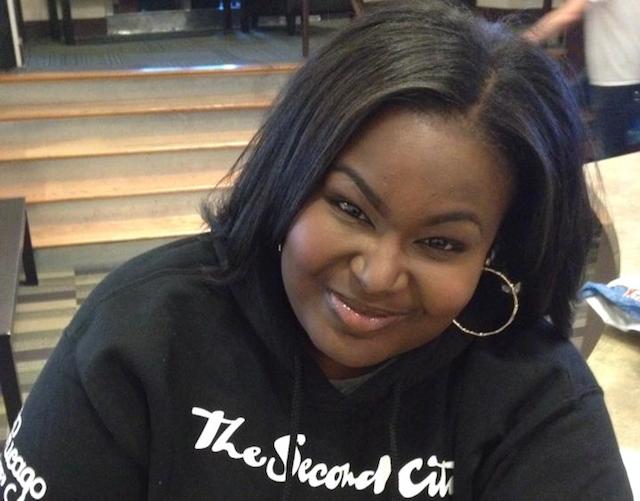Second City Performer Describes Her Run-In With Racist Starbucks Customer
By Mae Rice in News on Mar 22, 2016 9:51PM
Second City performer Rashida Olayiwola is boycotting the Starbucks at North Avenue and Wells Street, which occupies the same building as the Second City Training Center, after a patron there called her and her friend a racial slur and Starbucks employees did not intervene.
"Until they publicly apologize to me and my friend for being dehumanized, humiliated and embarrassed, I will never step foot in that Starbucks again,” South Side native Olayiwola told Chicagoist.
Starbucks apologized for the incident to Second City creative director Tyler Alexander, in a message pictured here, after he posted on Second City’s Facebook decrying the incident. Alexander told Chicagoist this morning that from an institutional perspective, “We feel like we came to some sort of resolution, with [Starbucks promising] additional training on how to deal with these incidents going forward.”
Starbucks has yet to publicly apologize to Olayiwola and her friend involved in the incident, fellow Second City performer Shantira Jackson.
Olayiwola deeply appreciates that Alexander took a stand on her behalf, though. (Alexander also continues to provide free coffee at Second City as an "alternative" to the Starbucks, for those who don't want to go.) "Tyler and his family are amazing people... they inspired other people to not stand for that,” she said. “So many people are quiet about this stuff." She wanted to be very clear about “how proud I am of the Second City for standing behind us, and letting [Starbucks] know that any type of racism will not be tolerated."
On Sunday, Olayiwola said she was in the Starbucks for an afternoon meeting with Jackson and author and comedian Claire Linic. They were brainstorming for a children’s book to "uplift black youth," she explained, which they’re all hoping to collaborate on.
At about 4:30 p.m., Olayiwola estimates, she went up to the Starbucks counter to buy some "sandwiches and bagels” to refuel. She was browsing the Starbucks cooler when another Starbucks customer, a white woman, told her not to touch anything in the cooler, which was filled entirely with pre-packaged food.
”She had to be about maybe 50, no more than 55,” Olayiwola recalled. “She looked about my mom's age, except my mom looks a lot better."
Asked if the woman appeared mentally ill, as Alexander suggested to Chicagoist, or homeless, as some Facebook commenters suggested when we posted our previous piece on this incident, Olayiwola said you can't tell much from a person's appearance, but “she had on a nice purple jacket that looked more expensive than anything I could afford at this moment.”
Olayiwola added, "I think we should stop blaming racism on mental illness.”
The woman was chastising Olayiwola right by the cashier, in the presence of the manager, a cashier, and seven or eight people—all of them white—waiting in line, according to Olayiwola.
The woman continued, telling Olayiwola that "I'm here first, I'm looking at things I want to buy, so you need to wait,” Olayiwola said.
Olayiwola replied that “this is not 1954” and said they could both look at the same time; the woman responded by asking the manager to call the police on Olayiwola.
"You know what's going on in this country with the police and us," Olayiwola said, an allusion to the countless cases of police brutality against black people that have come to light recently, including the Laquan McDonald case in Chicago. "No one was doing anything to help me."
Olayiwola called Jackson and Linic over to help her, and they tried to get the Starbucks manager to intervene. This was when the woman who had been bothering Olayiwola used a racial slur. According to Olayiwola, the woman said, "Don't come for me, these n*****s are the problem.”
The Starbucks manager, meanwhile, “ran to the back until we left."
"I [was] ready to do something I would regret,” Olayiwola recalled. “But I know I can't do what other people have the privileges to do or say." She, Jackson and Linic decided to leave and process what had happened in the Second City box office, where Linic’s husband, Allen, joined them.
Later, they went back to the Starbucks—where the woman who had harassed them was enjoying her coffee—and complained again, this time with Allen in tow.
The manager spoke to him, though “she refused to speak to us,” Olayiwola said. The manager’s response, though, was to shrug and claim it was Starbucks policy not to throw out paying customers, according to Olayiwola.
Olayiwola contests the existence of this policy. She’s been frequenting that Starbucks, a 24-hour location, since she was a student at Second City, and she recalls how sometimes, while in the thick of her training, she would nod off on the premises. She said that baristas were quick to tell her—"sweet as pie"—that she would have to leave if she couldn’t stay awake, though she was a paying customer, too.
"We as Black Americans have to deal with so many forms of racism every day,” Olayiwola concluded. “It's not fair."
She added, “I’ll never forget that day. Never.” The memory is so vivid, she says, “I can tell you what [the woman] bought.”
